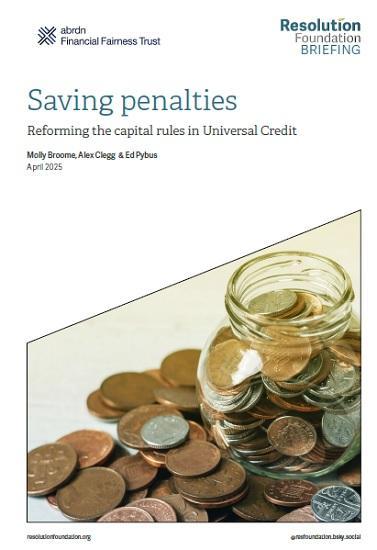Saving penalties - Reforming the capital rules in Universal Credit
25th April 2025

Means-tested benefits in Britain are built on the principle that individuals with significant financial resources should use those before turning to the state for help.
That's why wealth - as well as income - is assessed when determining eligibility and entitlement levels for means-tested support.
But while income means-testing has been widely studied and debated, capital means-testing has received far less attention. As the Government begins a review of Universal Credit, now is the time to assess whether these rules are fit for purpose.
Key findings
The capital rules potentially impact many households: we estimate that 2 million families who would otherwise have been eligible for Universal Credit on the basis of income in 2020-22 have reduced entitlement because of the capital rules.
Capital holdings varied significantly among these families.
Nearly half (47 per cent, or 930,000 families) had relatively modest capital of £16,000 or less, while 12 per cent (240,000 families) had capital between £50,000.01 and £100,000, and 16 per cent (315,000 families) held over £100,000.
Most of this capital was in ‘easy access' accounts: for families with capital of £50,000 or less, more than 80 per cent was held in current accounts, savings accounts, ISAs, or National Savings and Investment products.
The capital thresholds (the £6,000 disregard and the £16,000 upper limit) have been frozen since 2006. Had the thresholds risen with inflation, they would now be over £10,000 and £27,000, respectively.
As a result, more families have been brought into capital means-testing. In 2006-08, 35 per cent of working-age families in the UK had savings above £6,000, and 23 per cent exceeded £16,000. By 2020-22, these figures had risen to 46 per cent and 32 per cent.
The capital rules may be discouraging saving to some extent: in the two years leading up to March 2023, 7 per cent of UC recipients reported that they avoided saving due to the risk of losing benefits. Among Universal Credit recipients that could afford to save, this figure rose to 12 per cent.
Recommendations
The capital limits undermine other government-backed schemes that encourage saving. Help to Save is designed to promote saving among UC recipients, but its inclusion within the capital rules makes it difficult for some to build up savings buffers. To ensure policy consistency, savings in Help to Save accounts should be disregarded from the capital rules. This change would allow families to build up meaningful savings: two adults fully utilising their Help to Save accounts could save up to £13,200 - £6,000 within the disregarded threshold plus £7,200 in Help to Save - without losing any UC entitlement.
Likewise, Lifetime ISAs are designed to promote long-term - rather than precautionary – saving. So, it seems contradictory to expect people to run them down before being eligible for benefit support, not least because there are strict penalties to withdrawing savings early. To address this contradiction, Lifetime ISAs should also be disregarded from the capital rules.
Restoring the real value of the capital limits to their 2006 value is expensive – we estimate that it would cost the Exchequer around £800 million. So, while there is a case for reform, in practice this is not the highest priority for limited government resources. However, it is clearly unsustainable to keep the thresholds frozen indefinitely. We therefore recommend that the Government commits to indexing the thresholds with inflation, starting in April 2026, at an estimated cost of £135 million in 2029-30.
Finally, the Government should look at the cliff edge at £16,000 as part of its upcoming review of Universal Credit. The system would be fairer if the upper threshold was removed, and entitlement continued to be tapered away using a notional income from capital. We estimate this change would cost £900 million and extend Universal Credit entitlement to 270,000 families.
Read the full report HERE
Pdf 32 Pages
